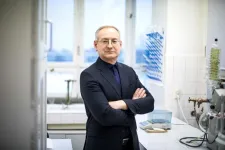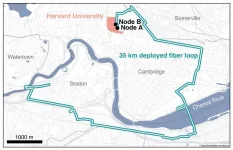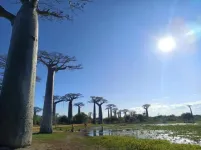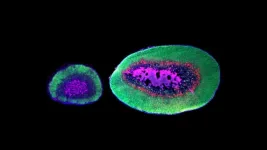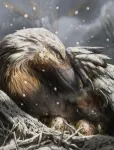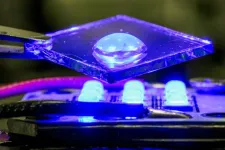(Press-News.org) SAN FRANCISCO – May 15, 2024 – San Francisco State University announced today that it received $14 million from the Genentech Foundation to support two University programs that are training the next generation of life sciences leaders. The new five-year grant is the latest in the Genentech Foundation’s transformational support for University programs, which has totaled more than $33 million during their long-lasting partnership. This partnership has impacted more than 700 students since 2008, and an additional 350 students are projected to be supported by the new funding.
The new funds will continue sponsoring San Francisco State’s Genentech Foundation Scholars and PINC (Promoting Inclusivity in Computing) programs. In 2008, an earlier iteration of the program that would become the Genentech Foundation Scholars program began at SF State to support graduate-level students with tuition and scholarships, mentorship, career preparation and research experience. In 2019, the Genentech Foundation awarded the University a historic $10.5 million grant to continue this program and expand support to undergraduate students, followed soon after by additional funding for the PINC program from the Genentech Foundation and Genentech Inc.
This latest $14 million grant will extend tuition support to freshmen and sophomores to cover full tuition for all undergraduate students in the Genentech Foundation Scholars Program for the first time. It will also increase support and research opportunities for students in the PINC programs.
Since the Genentech Foundation-SF State partnership began, the Genentech Foundation Scholars program has had a tangible impact on diversifying the STEM Ph.D. pipeline and increasing the number of underrepresented students in Ph.D. programs. One hundred and six students — 22 undergraduate and 84 master’s students — have enrolled in Ph.D. programs. Thirty-eight students have completed their Ph.D. program, with students from the 2019 grant cohorts still working on their Ph.D. degrees. Additionally, due to the support provided to remove barriers that typically prevent underrepresented students from completing their degrees in four years, the on-time graduation rate for undergraduate scholars in the program is three times higher than that of SF State students from similar backgrounds who are not in the program.
“The Genentech Foundation Scholars program isn’t just launching more students into Ph.D.s in science and medicine — it’s challenging the status quo perception of which institutions can produce top Ph.D. talent and which students are capable of leading tomorrow’s innovation,” said Kristin Campbell Reed, executive director of the Genentech Foundation. “SF State truly meets students where they are and believes in their boundless potential. We are proud to be doubling down on our investment and invite others to join us in what we believe is a scalable model for change.”
Genentech Foundation Scholars Program
$11.7 million of the grant will go to SF State’s Genentech Foundation Scholars Program. Each year, approximately 120 students participate in the year-long program. In addition to tuition, students receive a stipend and participate in research activities with the support of peer and faculty mentorship. The program offers summer research opportunities, preparatory calculus and chemistry courses for pre-freshmen participants, weekly career-preparation seminars and graduate school application prep.
PINC (Promoting Inclusivity in Computing) Program
The remaining $2.3 million of the grant will support SF State’s Gen-PINC Scholarship and PINC Summer Program, programs that empower students to develop computational skills applicable to real-world research and provide opportunities to work with researchers from industry and other academic institutions. For the Gen-PINC program, the grant renewal will increase the amount of scholarship funding each scholar receives, provide partial tuition for undergraduate scholarship recipients for the first time and expand the budget for student-mentor support. The new grant will also provide students in the eight-week PINC Summer Program more opportunities to explore their interests and develop skills critical for their future careers.
“Our partnership with the Genentech Foundation has accelerated the expansion of successful training programs preparing our diverse students for exciting graduate programs across the country,” said College of Science & Engineering Dean Carmen Domingo. “Working with Genentech scientists, our faculty are creating innovative curricula that apply machine learning approaches to solve real-world biotech problems. These experiences are making our students uniquely prepared for the biotech workforce needs of the future.”
Student impact
SF State undergraduate Sergio Gonzalez Jr. plans to become a professor at a research institute and a biotech leader in regenerative medicine. He’s also quick to emphasize that he wants to be an impactful mentor like the ones he has had at SF State and start programs like the ones he has benefited from. He was supported by both the Genentech Foundation Scholars Program and the Gen-PINC scholarship and has participated in other PINC programs. He originally transferred to SF State in 2013 but left in 2016 for personal reasons. During his academic hiatus, he began working as a medical assistant during the COVID-19 pandemic and realized his desire to help his community through research. He returned to SF State in 2022 to complete his education. Now, he’s making major strides toward his career goals by starting Vanderbilt University’s Interdisciplinary Graduate Ph.D. program in the fall to pursue biomedical research. He’s been awarded the prestigious National Science Foundation Graduate Research fellowship (NSF GRFP).
“I was able to tap into my inner confidence that everyone else saw in me, but I wasn’t really tapping into because of my situation,” he said of the impact of these programs. Gonzalez, like many students, was supporting himself. The financial support and mentorship from these Genentech Foundation-funded programs gave him the time and space to focus on research and achieve a 4.0 GPA.
“Learning that you don’t have to be this picture-perfect person to obtain these fellowships was crucial for me to pursuing them further because I left school,” Gonzalez explained. “When I came back, I remembered these programs and I told myself that in order for me to succeed, I need to be fully funded. These programs will help me get there.”
For more information about these programs, email Professor Emeritus of Biology Frank Bayliss at fbayl@sfsu.edu for Genentech Foundation Scholars and Program Manager Michael Savvides at pincsfsu@sfsu.edu for PINC.
###
About San Francisco State University
San Francisco State University is a public university serving students from the San Francisco Bay Area, across California and around the world, with nationally acclaimed programs that span a broad range of disciplines. More than 23,000 students enroll at the University each year, and its nearly 294,000 graduates have contributed to the economic, cultural and civic fabric of San Francisco and beyond. Through them — and more than 1,800 world-class faculty members — SF State proudly embraces its legacy of academic excellence, community engagement and commitment to social justice. For more information, visit sfsu.edu.
About the Genentech Foundation
Since 2002, the Genentech Foundation has worked to unlock access to educational and career pathways in the life sciences and medicine. The U.S.-based, private charitable foundation was established by Genentech, a leading biotechnology company that discovers, develops, manufactures and commercializes medicines to treat people with serious or life-threatening medical conditions. Genentech, a member of the Roche Group, has headquarters in South San Francisco, California. For further information, visit www.gene.com/good/giving.
END
SF State receives $14M from the Genentech Foundation to support underrepresented students in STEM
Over five years, the funds will support hundreds of STEM students through scholarships, research opportunities and career prep
2024-05-15
ELSE PRESS RELEASES FROM THIS DATE:
Penalties for dropping out of ecosystem services incentive programs should equal lost environmental benefits
2024-05-15
Payment for Ecosystem Services programs (PES) are important tools that governments around the world use to improve water quality, protect forests and wildlife habitat, and sequester carbon. Under these programs, landowners - usually farmers - are paid to use their land in ways that protect or restore the environment, such as replacing row crops with trees or grassy zones adjacent to waterways. Many PES program contracts last 5 to 20 years, but participant drop out rates have consistently risen over the years.
A recent study by University of Maryland economists showed that PES programs ...
Lithuanian researchers’ new development in solar cell technology – a promise of a significant advancement in the field
2024-05-15
Researchers from Kaunas University of Technology (KTU), Lithuania, who contributed to the development of record-breaking solar cells a few years ago, expanded their invention. The self-assembled monolayers can now be applied not only in inverted but also in regular structure perovskite solar cells.
Self-assembling molecules arrange themselves into a single-molecule-thick layer and in this case, they act as an electron-transporting layer in solar cells.
“The molecules that make up these monolayers, like a clever glue, ...
A simple internet with significant possibilities
2024-05-15
It’s one thing to dream up a quantum internet that could send hacker-proof information around the world via photons superimposed in different quantum states. It’s quite another to physically show it’s possible.
That’s exactly what Harvard physicists have done, using existing Boston-area telecommunication fiber, in a demonstration of the world’s longest fiber distance between two quantum memory nodes to date. Think of it as a simple, closed internet between point A and B, carrying a signal encoded not by classical ...
Unwrapping the origin story of the baobab
2024-05-15
The baobab (Adansonia) is a genus of trees with eight extant (in existence currently) species and a long history of humans marveling at them. For as much admiration the baobabs get, there is an equal amount of mystery surrounding their origin.
Genomic and ecological analyses recently done by a global research team led by Sino-Africa Joint Research Center, CAS (hosted by Wuhan Botanical Garden of the Chinese Academy of Sciences), suggest that Madagascar, is the origin from where all other baobab species hail. With a deeper understanding of the baobabs' genetics, researchers are hoping to uncover some clues on what ...
The origin and long-distance travels of upside down trees
2024-05-15
The iconic baobabs, also known as upside-down trees, or the tree of life, have much cultural significance, inspiring innumerable arts, folklore, and traditions. A research published in Nature, involving international collaboration between Wuhan Botanical Garden (China), Royal Botanic Gardens (Kew, UK), University of Antananarivo (Madagascar) and Queen Mary University of London (UK) reveal a remarkable example of species radiation in Madagascar followed by long distance dispersal to Africa and Australia. With speciation, an astonishing divergence of pollination mechanisms evolved, that exploit hawkmoths, bats and lemurs for ...
Some mice may owe their monogamy to a newly evolved type of cell
2024-05-15
NEW YORK, NY — What makes the oldfield mouse steadfastly monogamous throughout its life while its closest rodent relatives are promiscuous? The answer may be a previously unknown hormone-generating cell, according to a new study published online today in Nature from scientists at Columbia's Zuckerman Institute.
"The hormone from these cells was actually first discovered in humans many decades ago, but nobody really knew what it did," said Andrés Bendesky, MD, PhD, a principal investigator at Columbia's Zuckerman Institute. "We’ve discovered ...
Mortality in patients hospitalized for COVID-19 vs influenza in fall-winter 2023-2024
2024-05-15
About The Study: This study found that in fall-winter 2023-2024, the risk of death in patients hospitalized for COVID-19 was greater than the risk of death in patients hospitalized for seasonal influenza.
Corresponding Author: To contact the corresponding author, Ziyad Al-Aly, M.D., email ziyad.alaly@va.gov.
To access the embargoed study: Visit our For The Media website at this link https://media.jamanetwork.com/
(doi:10.1001/jama.2024.7395)
Editor’s Note: Please see the article for additional information, including other authors, author contributions and affiliations, conflict of interest and financial disclosures, and funding and support.
# # ...
First ‘warm-blooded’ dinosaurs may have emerged 180 million years ago
2024-05-15
The ability to regulate body temperature, a trait all mammals and birds have today, may have evolved among some dinosaurs early in the Jurassic period about 180 million years ago, suggests a new study led by UCL and University of Vigo researchers.
In the early 20th century, dinosaurs were considered slow-moving, “cold-blooded” animals like modern-day reptiles, relying on heat from the sun to regulate their temperature. Newer discoveries indicate some dinosaur types were likely capable of generating their own body heat but when this adaptation occurred is unknown.
The new study, published in the journal Current Biology, looked at ...
Next-generation sustainable electronics are doped with air
2024-05-15
Semiconductors are the foundation of all modern electronics. Now, researchers at Linköping University, Sweden, have developed a new method where organic semiconductors can become more conductive with the help of air as a dopant. The study, published in the journal Nature, is a significant step towards future cheap and sustainable organic semiconductors.
“We believe this method could significantly influence the way we dope organic semiconductors. All components are affordable, easily accessible, and potentially environmentally friendly, which is a prerequisite for future sustainable ...
Disparities in patient portal engagement among patients with hypertension treated in primary care
2024-05-15
About The Study: This cohort study of patients with hypertension found clear sociodemographic disparities in patient portal engagement among those treated in primary care. Without special efforts to engage patients with portals, interventions that use patient portals to target hypertension may exacerbate disparities.
Corresponding Author: To contact the corresponding author, Rasha Khatib, Ph.D., M.H.S., email rasha.alkhatib@aah.org.
To access the embargoed study: Visit our For The Media website at this link https://media.jamanetwork.com/
(doi:10.1001/jamanetworkopen.2024.11649)
Editor’s Note: Please see ...
LAST 30 PRESS RELEASES:
Novel structural insights into Phytophthora effectors challenge long-held assumptions in plant pathology
Q&A: Researchers discuss potential solutions for the feedback loop affecting scientific publishing
A new ecological model highlights how fluctuating environments push microbes to work together
Chapman University researcher warns of structural risks at Grand Renaissance Dam putting property and lives in danger
Courtship is complicated, even in fruit flies
Columbia announces ARPA-H contract to advance science of healthy aging
New NYUAD study reveals hidden stress facing coral reef fish in the Arabian Gulf
36 months later: Distance learning in the wake of COVID-19
Blaming beavers for flood damage is bad policy and bad science, Concordia research shows
The new ‘forever’ contaminant? SFU study raises alarm on marine fiberglass pollution
Shorter early-life telomere length as a predictor of survival
Why do female caribou have antlers?
How studying yeast in the gut could lead to new, better drugs
Chemists thought phosphorus had shown all its cards. It surprised them with a new move
A feedback loop of rising submissions and overburdened peer reviewers threatens the peer review system of the scientific literature
Rediscovered music may never sound the same twice, according to new Surrey study
Ochsner Baton Rouge expands specialty physicians and providers at area clinics and O’Neal hospital
New strategies aim at HIV’s last strongholds
Ambitious climate policy ensures reduction of CO2 emissions
Frontiers in Science Deep Dive webinar series: How bacteria can reclaim lost energy, nutrients, and clean water from wastewater
UMaine researcher develops model to protect freshwater fish worldwide from extinction
Illinois and UChicago physicists develop a new method to measure the expansion rate of the universe
Pathway to residency program helps kids and the pediatrician shortage
How the color of a theater affects sound perception
Ensuring smartphones have not been tampered with
Overdiagnosis of papillary thyroid cancer
Association of dual eligibility and medicare type with quality of postacute care after stroke
Shine a light, build a crystal
AI-powered platform accelerates discovery of new mRNA delivery materials
Quantum effect could power the next generation of battery-free devices
[Press-News.org] SF State receives $14M from the Genentech Foundation to support underrepresented students in STEMOver five years, the funds will support hundreds of STEM students through scholarships, research opportunities and career prep
